|
|
|
Sort Order |
|
|
|
Items / Page
|
|
|
|
|
|
|
| Srl | Item |
| 1 |
ID:
159131
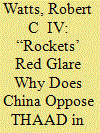

|
|
|
|
|
| Summary/Abstract |
China’s purported fears about the introduction of defensive missiles into South Korea are likely insincere
or misplaced, leaving concerns about the beneficial effects on U.S. alliances as the probable
explanation for its opposition.
|
|
|
|
|
|
|
|
|
|
|
|
|
|
|
|
| 2 |
ID:
155257
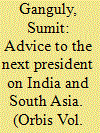

|
|
|
|
|
| Summary/Abstract |
A change in U.S. administrations can often result in significant policy shifts. However, in the case of South Asia, with marked exceptions, U.S. policy has been mostly consistent. That said, the new administration will confront important challenges at global, regional, and bilateral levels that involve South Asia. To that end, the administration will have to deal with questions of climate change, global trade, and transnational terror. It will also have to confront the nettlesome question of the future of Afghanistan as well as the growing religious intolerance and conflict in the overall region. Finally, given India’s significance to the region and beyond, it will need to devise policies designed to place the bilateral relationship on a more secure footing.
|
|
|
|
|
|
|
|
|
|
|
|
|
|
|
|
| 3 |
ID:
090199
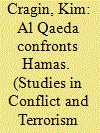

|
|
|
|
|
| Publication |
2009.
|
| Summary/Abstract |
Almost eight years after the September 2001 attacks, U.S. counterterrorism strategy would benefit from a clearer definition of its adversaries. Some have suggested that U.S. counterterrorism policy focus primarily on Sunni jihadists. This term would account for groups such as Al Qaeda and the Abu Sayyaf Group in the Philippines, but not Shi'ite militias in Iraq or Hizbullah. Although any attempt to narrow the scope of U.S. counterterrorism strategy has merit, it is worth noting that important distinctions exist between the various groups. To explore these distinctions, this article examines the different historical trajectories and current arguments between two of the most well-known Sunni jihadists: Al Qaeda and Hamas.
|
|
|
|
|
|
|
|
|
|
|
|
|
|
|
|
| 4 |
ID:
151339
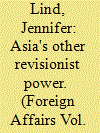

|
|
|
|
|
| Summary/Abstract |
Donald Trump’s election as U.S. president threatens to upend the world’s most important bilateral relationship. On the campaign trail, Trump promised to label China a currency manipulator and to respond to its “theft of American trade secrets” and “unfair subsidy behavior” by levying a 45 percent tariff on Chinese exports [2]. As president-elect, he reversed four decades of U.S. policy when he spoke by telephone with Taiwanese President Tsai Ing-wen and declared [3] that the United States was not bound by the “one China” policy, the diplomatic understanding that has underpinned Washington’s approach to Beijing since 1979.
|
|
|
|
|
|
|
|
|
|
|
|
|
|
|
|
| 5 |
ID:
183289
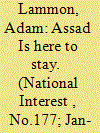

|
|
|
|
|
| Summary/Abstract |
A new U.S. policy that sees Syria readmitted into the regional fold is not intended to “reward” Bashar al-Assad for his barbarous behavior over the last decade, but for the United States to pick winners and losers in the Middle East.
|
|
|
|
|
|
|
|
|
|
|
|
|
|
|
|
| 6 |
ID:
141545
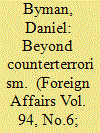

|
|
|
|
|
| Summary/Abstract |
When the Obama administration looks at the Middle East [2], it does so through the lens of counterterrorism. A systematic emphasis on the subject has underscored not just the administration’s relentless pursuit of al Qaeda and its new focus on the self-proclaimed Islamic State [3] (or ISIS) but also a wider swath of its foreign policy, from its drone campaign in northwestern Pakistan to its maintenance of the detention facility in Guantánamo Bay.
|
|
|
|
|
|
|
|
|
|
|
|
|
|
|
|
| 7 |
ID:
150328
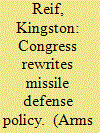

|
|
|
|
|
| Summary/Abstract |
In a significant departure from long-standing U.S. policy, lawmakers voted in December to expand the declared role of U.S. national ballistic missile defenses.
|
|
|
|
|
|
|
|
|
|
|
|
|
|
|
|
| 8 |
ID:
138997
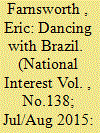

|
|
|
|
|
| Summary/Abstract |
BRAZIL IS on the move. Its economic strength over the past decade has provided the primary means for it to develop long-standing ambitions for a larger global-leadership stake—a path that U.S. policy makers have encouraged for many years, presuming that a stronger, democratic Brazil more actively engaged globally would be a natural ally for the United States. In so doing, however, it has pursued a foreign policy independent of Washington, leading at times to misunderstandings and dashed hopes. This was in evidence even before the revelations of National Security Agency contractor Edward Snowden in 2013 temporarily froze bilateral relations.
|
|
|
|
|
|
|
|
|
|
|
|
|
|
|
|
| 9 |
ID:
183288
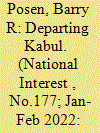

|
|
|
|
|
| Summary/Abstract |
The carnival of recrimination that erupted since the collapse of the Afghan government serves mainly to cover the tracks of years of U.S. mistakes and set the stage for future misguided interventions.
|
|
|
|
|
|
|
|
|
|
|
|
|
|
|
|
| 10 |
ID:
141788
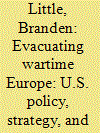

|
|
|
|
|
| Summary/Abstract |
The U.S. government facilitated the repatriation of more than 125,000 Americans stranded in Europe upon the outbreak of the First World War in 1914 by declaring neutrality and dispatching the U.S. Relief Commission, which comprised U.S. warships carrying gold to assist desperate citizens. Participating U.S. officers conducted unauthorized tours of battlefields and arms plants to glean intelligence that would aid American mobilization plans. The relief commissioners and many of the Americans they aided, moreover, championed additional humanitarian interventions in war-torn regions and catalyzed the defense preparedness movement in the United States.
|
|
|
|
|
|
|
|
|
|
|
|
|
|
|
|
| 11 |
ID:
089326
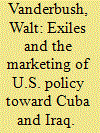

|
|
|
|
|
| Publication |
2009.
|
| Summary/Abstract |
This paper analyses the role of Cuban Americans and Iraqi Americans as allies of like-minded public officials in the marketing of contested foreign policies to the United States public. Each of these ethnic exile communities played a traditional lobbying role as would be expected of interest groups, but the argument here is that the interactive relationship between the ethnic interest groups and government officials in advocating policy is the more interesting development in these cases. While there are differences in the two cases, the similarities between marketing an embargo and an invasion suggest that foreign-policy analysts may want to pay closer attention to the interactive relationship between exile communities and government officials in policy advocacy. I suggest in conclusion that we need to be wary of according defectors and exiles privileged positions in future foreign-policy debates.
|
|
|
|
|
|
|
|
|
|
|
|
|
|
|
|
| 12 |
ID:
152910
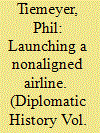

|
|
|
|
|
| Summary/Abstract |
This article examines the civil aviation sector to demonstrate Yugoslavia's growing economic ties to the Global South thanks to nonalignment. It also considers U.S. reactions to Yugoslavia's growth as an aviation hub, in an effort to reassess the “wedge” strategy that dominated U.S. policy toward Yugoslavia during the Cold War.
|
|
|
|
|
|
|
|
|
|
|
|
|
|
|
|
| 13 |
ID:
175750
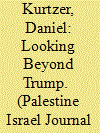

|
|
|
|
|
| Summary/Abstract |
From its inception, the Trump administration has had three objectives in relation to Israel and the Palestinians. The most important of these has been to “change the paradigm” of peacemaking. U.S. Ambassador to Israel David Friedman indicated this in a February 11, 2020 presentation at the Jerusalem Center for Public Affairs,1 and this has been a theme in many of the public pronouncements by Trump’s advisors. Their view, echoing that of the president, has been that all previous peace efforts have failed and that they know best how to make a good deal.
|
|
|
|
|
|
|
|
|
|
|
|
|
|
|
|
| 14 |
ID:
148175
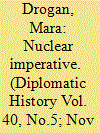

|
|
|
|
|
| Summary/Abstract |
In December 1953, President Dwight D. Eisenhower gave speech, soon known as “Atoms for Peace,” before the United Nations in which he promised to share non-military nuclear technology with the nations of the world. Very few members of his administration were aware of the proposal before it was made and in the months after the speech was given, they debated its intention and its implications for policy. This article examines the process by which members of the National Security Council, the State Department, and the Atomic Energy Commission devised a policy to put Eisenhower’s promises into practice. Intelligence reports, NSC debates, and policy drafts reveal that although members of the Eisenhower Administration believed that nuclear power was neither economical nor ready for export and represented a serious proliferation risk, they were convinced that the international political landscape left them no choice but to proceed with the sharing of technology worldwide.
|
|
|
|
|
|
|
|
|
|
|
|
|
|
|
|
| 15 |
ID:
089141
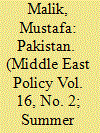

|
|
|
|
|
| Publication |
2009.
|
| Summary/Abstract |
Ever since 9/11, American's preoccupation in Pakistan has been with "terrorism".Anti-American Pakistan militants call it part of their jihad against the U.S.-NATO "occupation" of Afghanistan.
|
|
|
|
|
|
|
|
|
|
|
|
|
|
|
|
| 16 |
ID:
176591
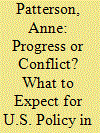

|
|
|
|
|
| Summary/Abstract |
The following is a transcript of the 101th in a series of Capitol Hill conferences convened by the Middle East Policy Council. The event took place on July 17, 2020, via Zoom with Council Vice‐Chair Gina Abercrombie‐Winstanley moderating, Council President Richard J. Schmierer contributing and Council Executive Director Thomas R. Mattair serving as discussant.
|
|
|
|
|
|
|
|
|
|
|
|
|
|
|
|
| 17 |
ID:
157309
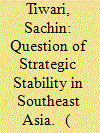

|
|
|
|
|
| Summary/Abstract |
United States emergence in the aftermath of World War II created a regional stability in Southeast Asia by being the security guarantor of the region and establishing a rule-based order. Creation of ASEAN as a regional forum leaped the way forward for institution-based order. However, the 21st century has posed new challenges and opportunities.
|
|
|
|
|
|
|
|
|
|
|
|
|
|
|
|
| 18 |
ID:
138996
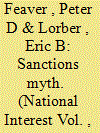

|
|
|
|
|
| Summary/Abstract |
SINCE 2005, American policy makers have increasingly turned to sophisticated types of economic sanctions as a foreign-policy tool of first resort. From the development of banking sanctions limiting Iran’s ability to secure financing from Western capital markets to new sanctions targeting Russia’s financial system and the development of its oil resources, U.S. policy makers are touting these innovative tools as extremely powerful while also being tailored and precise. The Obama administration’s 2015 National Security Strategy, for example, said that “targeted economic sanctions remain an effective tool for imposing costs on . . . irresponsible actors” and that “our sanctions will continue to be carefully designed and tailored to achieve clear aims while minimizing any unintended consequences for other economic actors, the global economy, and civilian populations.”
|
|
|
|
|
|
|
|
|
|
|
|
|
|
|
|
| 19 |
ID:
147221
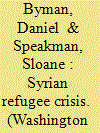

|
|
|
|
|
| Summary/Abstract |
The Syrian civil war has spawned a host of evils. Perhaps 400,000 Syrians have died in the carnage, and regional powers like Iran and Saudi Arabia treat it as a proxy war. Terrorist groups like the Islamic State seem to delight in creating new horrors for those who fall into their clutches, and use Syria as a base to expand in the Middle East, attack Europe, and inspire terrorists around the world. Syria’s problems, however, are also the world’s problems, and no problem is more immediate than the country's refugees.
|
|
|
|
|
|
|
|
|
|
|
|
|
|
|
|
| 20 |
ID:
156941
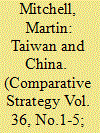

|
|
|
|
|
| Summary/Abstract |
Located offshore of Asia and Mainland China, Taiwan possesses strategic significance because of its location between Japan and The Philippines. Current U.S. policy dates from conditions existent during the Cold War, when China was relatively isolated, economically underdeveloped, and still undergoing the Cultural Revolution, while Taiwan was under martial law and ruled by an authoritarian dictatorship. Taiwan has since evolved into a multiparty, representative democracy while China has transformed itself into a major power, but has retained the one-party authoritarian rule of the Chinese Communist Party. U.S. policy needs readjusting to align with contemporary realities and future trends, which includes finding a balance between its One China policy and allowing the people of Taiwan a significant say in their future. Current American policy fosters a future scenario of poor choices to be made in the context of a crisis instigated at a time of China's choosing.
|
|
|
|
|
|
|
|
|
|
|
|
|
|
|
|
|
|
|
|
|